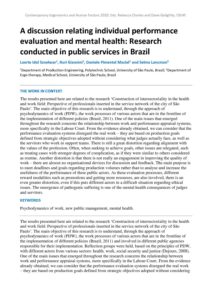| Document | Author Laerte Idal Sznelwar, Ruri Giannini, Daniele Pimentel Maciel and Selma Lancman |
| Abstract The results presented here are related to the research ‘Construction of intersectoriality in the health and work field: Perspective of professionals inserted in the service network of the city of São Paulo’. The main objective of this research is to understand, through the approach of psychodynamics of work (PDW), the work processes of various actors that are in the frontline of the implementation of different policies (Brasil, 2011). One of the main issues that emerged throughout the research concerns the relationship between work and performance appraisal systems, more specifically in the Labour Court. From the evidence already obtained, we can consider that the performance evaluation systems disregard the real work – they are based on production goals defined from strategic objectives adopted without considering what judges actually face, as well as the servitors who work in support teams. There is still a great distortion regarding alignment with the values of the profession. Often, when seeking to achieve goals, other issues are relegated, such as treating cases with stronger degrees of complication, as if they were similar to others considered as routine. Another distortion is that there is not really an engagement in improving the quality of work – there are almost no organisational devices for discussion and feedback. The main purpose is to meet deadlines and goals regarding production volumes rather than to analyse and increase the usefulness of the performance of these public actors. As these evaluation processes, different reward modalities such as promotions and getting more resources, are also involved, there is an even greater distortion, even if this puts different actors in a difficult situation regarding ethical issues. The emergence of pathogenic suffering is one of the mental health consequences of judges and servitors. |

